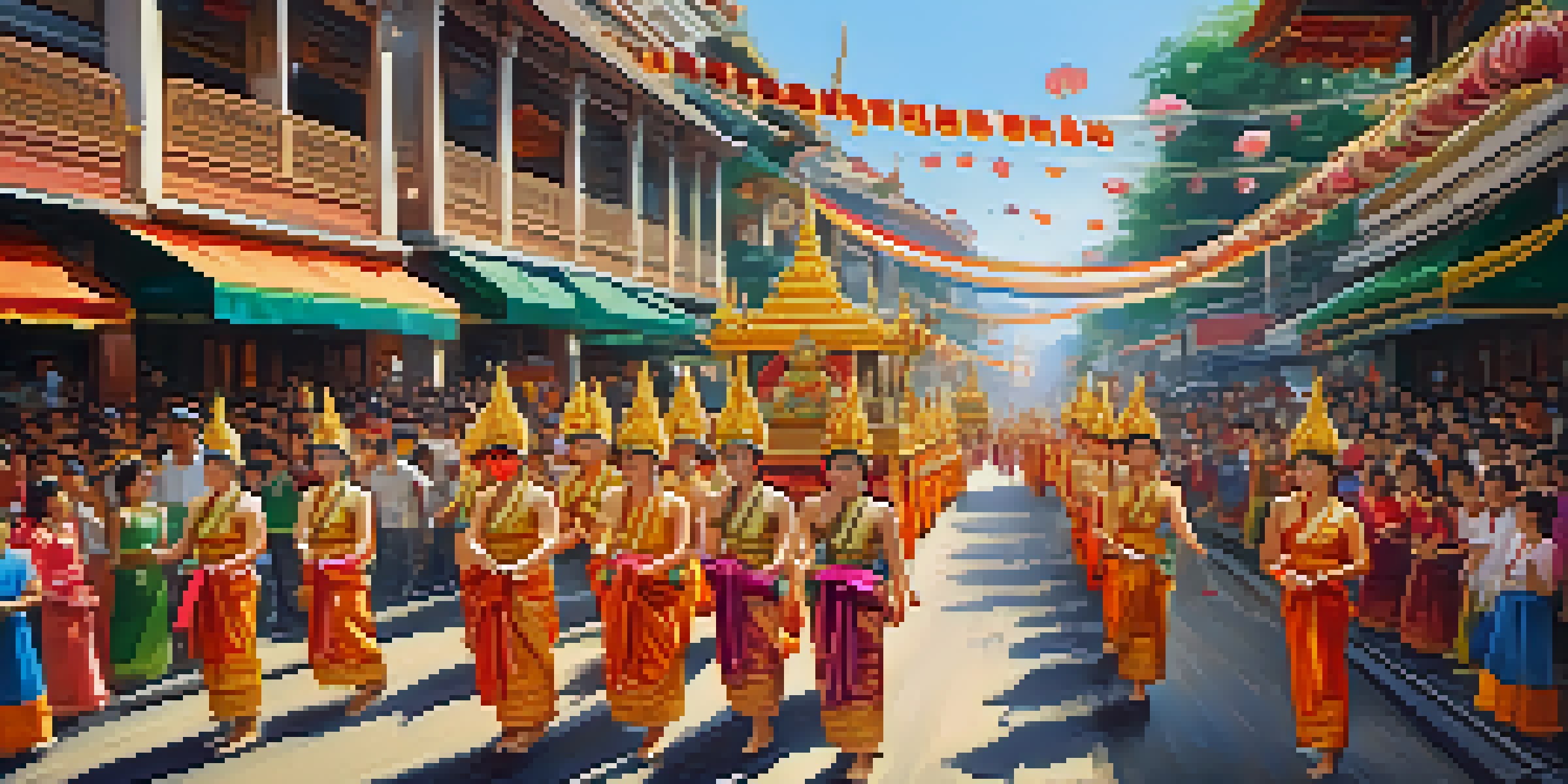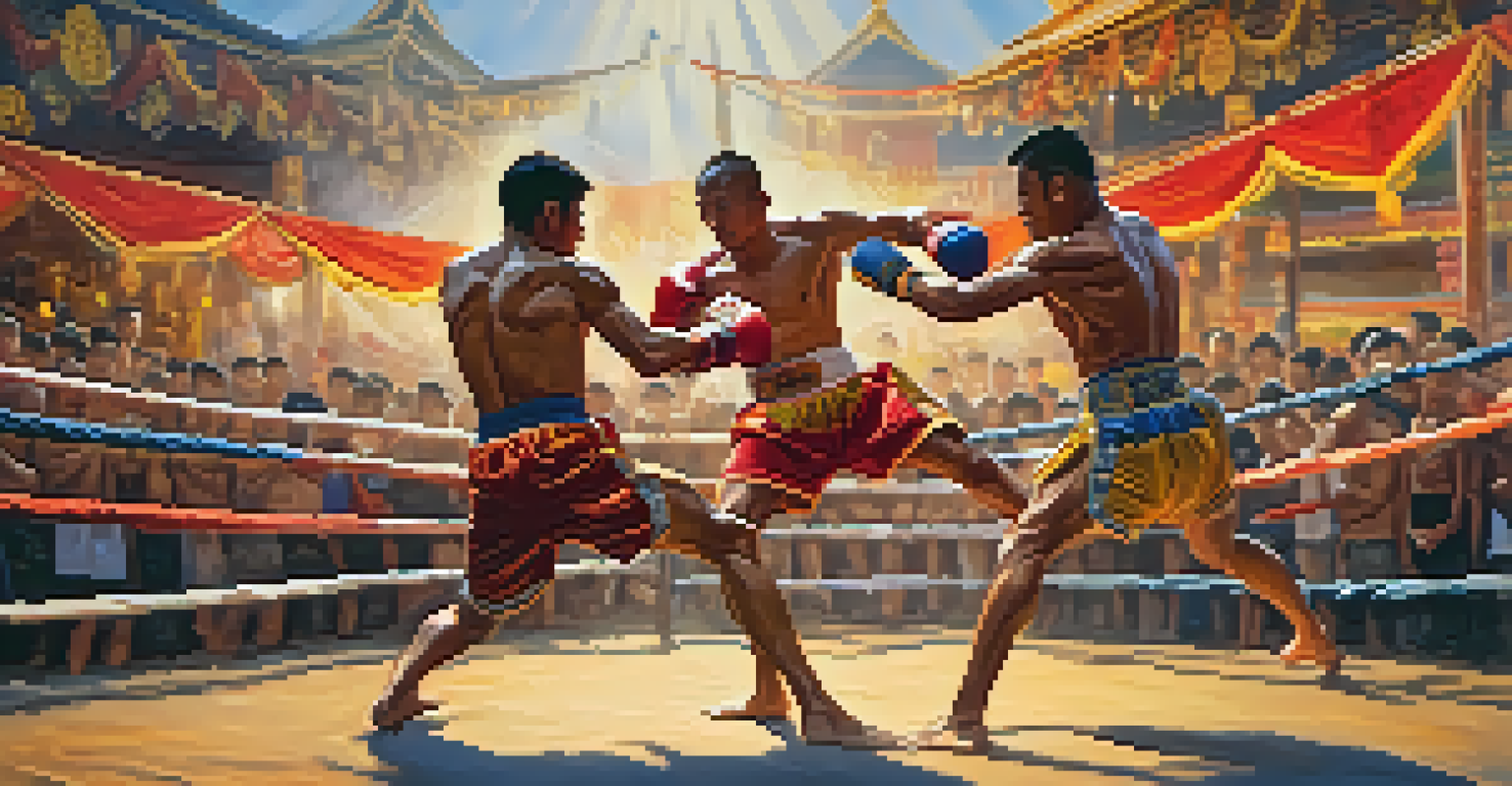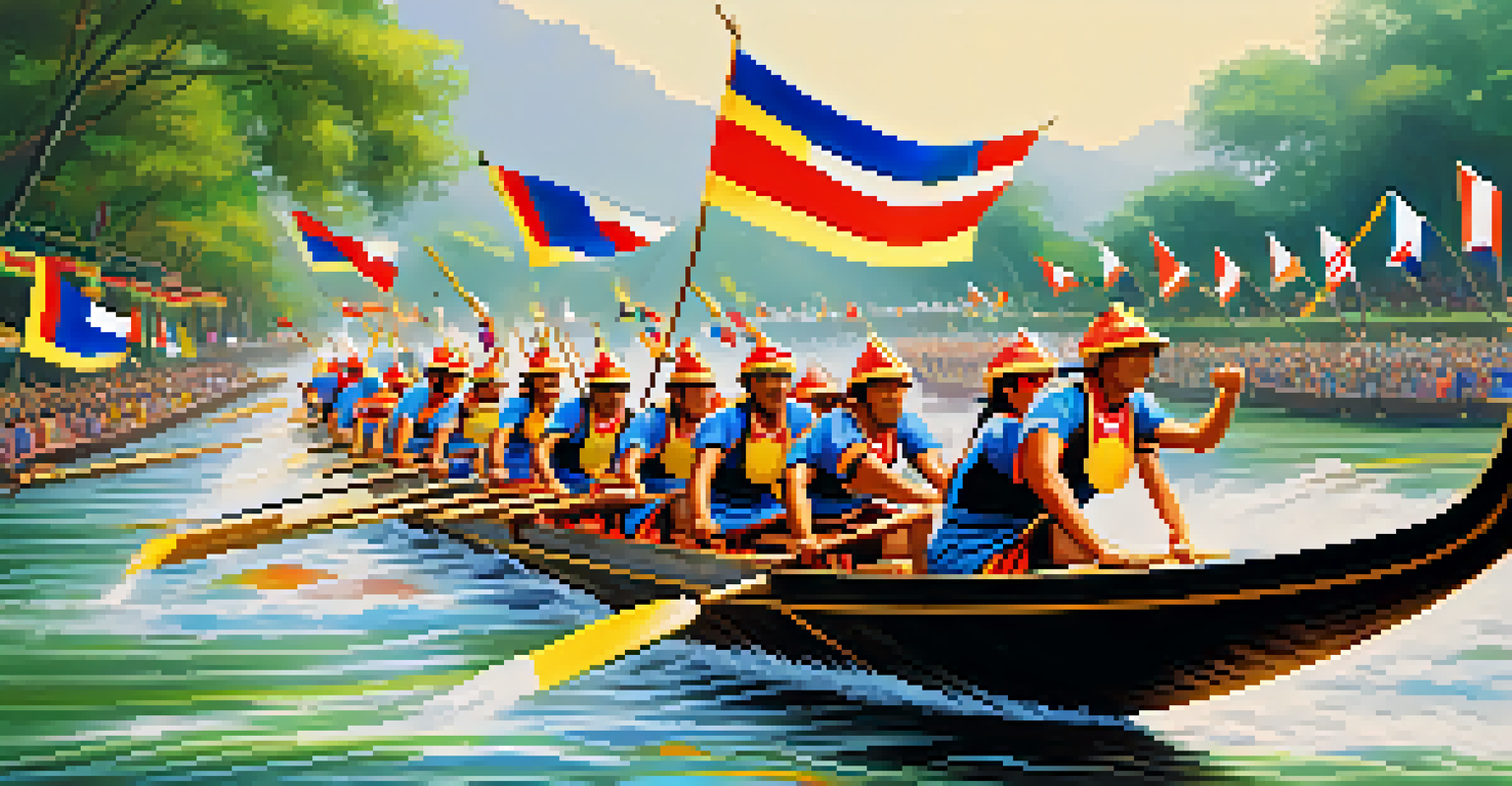The Role of Traditional Sports in Thai Festivals

Introduction to Thai Festivals and Their Cultural Importance
Thai festivals are vibrant celebrations that reflect the rich cultural heritage of Thailand. These events often feature traditional sports, which play a crucial role in showcasing local customs and community spirit. From the colorful parades to the lively music, festivals create an atmosphere of joy and connection among participants and spectators alike.
Tradition is not the worship of ashes, but the preservation of fire.
Each festival is unique, often linked to the agricultural calendar or religious observances, making them a vital part of Thai life. The inclusion of traditional sports provides a dynamic element that engages the audience and keeps age-old traditions alive. These sports are not just games; they are a way to honor ancestors and celebrate the community's shared identity.
As we delve deeper into this topic, we'll explore specific traditional sports featured in Thai festivals and their significance to cultural preservation. Understanding these elements helps us appreciate the intricate tapestry of Thai society and the roles these festivals play in its continuity.
Muay Thai: The Art of Eight Limbs in Celebrations
Muay Thai, often referred to as the 'Art of Eight Limbs,' is a striking martial art that embodies Thailand's spirit and history. During festivals, exhibitions and competitions are held to showcase this electrifying sport, drawing large crowds and creating an atmosphere of camaraderie. The fighters, adorned in traditional attire, perform rituals that honor their trainers and ancestors, adding depth to the spectacle.

The presence of Muay Thai in festivals emphasizes physical strength, discipline, and respect—values deeply rooted in Thai culture. Spectators are not just passive observers; they often cheer enthusiastically, creating a sense of community and shared pride. This connection between the sport and the audience exemplifies how traditional sports serve as a bridge linking generations.
Traditional Sports Enhance Cultural Identity
Traditional sports during Thai festivals preserve cultural heritage and promote community spirit.
Moreover, Muay Thai's popularity extends beyond Thailand's borders, promoting cultural exchange and understanding. As visitors experience this sport during festivals, they gain insights into the Thai way of life, further enriching the cultural tapestry of the event.
Traditional Boat Racing: A Symbol of Teamwork and Unity
One of the most exciting events during Thai festivals is traditional boat racing, particularly celebrated during the Buddhist Lent. Teams from different villages come together to compete in beautifully decorated longboats, showcasing not only their speed but also their teamwork and synchronization. The races are thrilling, with spectators lining the shores, cheering for their favorite teams.
Sports do not build character. They reveal it.
The significance of boat racing goes beyond mere competition; it fosters a sense of community and unity among participants. Each rower plays a vital role, and their success depends on collective effort and coordination. This spirit of teamwork resonates with the values of cooperation and togetherness that are central to Thai culture.
Additionally, the festival atmosphere surrounding the races includes food stalls, music, and cultural performances, making it a comprehensive celebration. Through traditional boat racing, communities not only honor their heritage but also strengthen their bonds, ensuring that these cherished traditions endure for future generations.
Takraw: The Fast-Paced Game That Captivates Audiences
Takraw, a sport that combines elements of volleyball and soccer, is another thrilling feature of Thai festivals. Played with a rattan ball, the game showcases incredible athleticism and agility as players use their feet, knees, chest, and head to keep the ball in the air. The fast-paced nature of takraw captures the attention of festival-goers, making it a highlight of the celebrations.
This traditional sport highlights the importance of skill and precision, as players execute impressive tricks and strategies. The energy in the air is palpable as spectators cheer on their teams, creating an electrifying atmosphere. It’s a perfect example of how sports can bring people together, transcending age and background.
Festivals Foster Community Unity
Events like boat racing and Muay Thai showcase teamwork and camaraderie, strengthening community bonds.
Moreover, takraw serves as a reminder of the rich history of Southeast Asian sports and their evolution over time. By featuring this game in festivals, Thailand preserves its cultural uniqueness while also inviting visitors to participate in the excitement and learn about its origins.
The Role of Folk Games: Connecting Generations
Folk games, such as 'Pee Mak' and 'Chaiyaphum', are another integral part of Thai festivals, often enjoyed by families and communities. These games are not only fun but also serve as a way to pass down traditions and values from one generation to the next. By participating in these games, children learn about their culture in an engaging and enjoyable manner.
The simplicity of folk games allows everyone, regardless of age or skill level, to join in the festivities. This inclusivity fosters a sense of belonging and reinforces community ties. These games often include elements of storytelling and folklore, enriching the experience and offering insights into Thai history and customs.
Moreover, the playful competition that arises during these games encourages social interaction and laughter, making festivals memorable for all participants. As families engage in these activities, they create lasting memories that strengthen their cultural identity and heritage.
Cultural Significance of Traditional Sports in Festivals
Traditional sports play a vital role in preserving Thai culture and identity, especially during festivals. They serve as a living testament to the customs and traditions passed down through generations. By engaging in these sports, communities reinforce their cultural heritage and instill pride in their history.
Moreover, the competitive spirit found in traditional sports fosters a sense of unity and camaraderie among participants. The shared experience of training and competing creates bonds that transcend individual differences, emphasizing the importance of community in Thai society. This is particularly evident during festivals, where the atmosphere of celebration enhances these connections.
Future of Sports in Cultural Preservation
Efforts to integrate traditional sports into education and community events are crucial for maintaining cultural identity.
As traditional sports continue to evolve and adapt, they remain a critical aspect of Thai festivals, ensuring that the culture remains vibrant and relevant. By participating in these activities, both locals and visitors alike can appreciate the depth of Thai traditions and the significance of sports in fostering cultural identity.
The Future of Traditional Sports in Thai Festivals
As globalization influences cultures around the world, the future of traditional sports in Thai festivals is an important consideration. While modern sports gain popularity, there is a growing movement to preserve and promote traditional games as a way to maintain cultural identity. Festivals serve as a platform for this revitalization, attracting attention and interest from both locals and tourists.
Efforts to integrate traditional sports into educational programs and community events are essential for ensuring their longevity. By engaging younger generations, these sports can continue to thrive and adapt while remaining true to their roots. Such initiatives not only celebrate heritage but also encourage pride in one's culture.

Ultimately, the resilience of traditional sports in Thai festivals showcases the importance of cultural preservation. As communities come together to celebrate their heritage, they contribute to a rich legacy that future generations can cherish and uphold.
Conclusion: Celebrating Tradition Through Sports
In conclusion, traditional sports are an essential part of Thai festivals, enriching the cultural landscape and fostering community spirit. They provide a unique opportunity for people to connect with their heritage while enjoying the thrill of competition. From Muay Thai to folk games, these activities illustrate the intricate relationship between sports and culture in Thailand.
As we reflect on the role of traditional sports in festivals, it's clear that they do more than entertain; they preserve history, promote unity, and celebrate identity. In a rapidly changing world, these sports serve as anchors, reminding us of what unites us as a community and a nation.
By embracing and promoting traditional sports during festivals, Thailand not only highlights its rich cultural heritage but also invites everyone to participate in the joy of celebration. As these traditions continue to thrive, they will ensure that future generations can experience the vibrancy and significance of Thai culture.